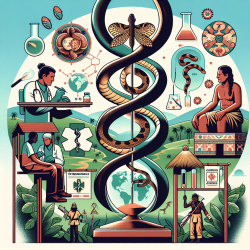Introduction
Snakebites pose a significant public health challenge, particularly in rural areas of Brazil. The study titled Snakebites in Rural Areas of Brazil by Race: Indigenous the Most Exposed Group provides critical insights into the racial disparities in snakebite exposure and outcomes. This blog aims to guide practitioners in leveraging these findings to enhance healthcare delivery and outcomes for affected populations.
Key Findings
The study highlights that indigenous populations in Brazil are disproportionately affected by snakebites, with exposure rates significantly higher than other racial groups. The fatality rate among indigenous individuals is 3.5 times higher than that of white individuals. Factors contributing to these disparities include delayed access to healthcare and limited availability of antivenom in remote areas.
Implications for Practitioners
Practitioners can play a pivotal role in mitigating the impact of snakebites by focusing on the following areas:
- Timely Intervention: Encourage rapid response and treatment to reduce the time between the snakebite and medical care. The study shows that outcomes worsen significantly with delays in treatment.
- Decentralization of Resources: Advocate for the decentralization of antivenom distribution to ensure it is readily available in remote and rural areas, particularly in indigenous communities.
- Cultural Sensitivity: Incorporate cultural knowledge and practices into healthcare strategies to improve trust and engagement with indigenous populations.
- Education and Prevention: Implement educational programs that focus on snakebite prevention and the importance of seeking immediate medical attention.
Encouraging Further Research
While this study provides valuable insights, there is a need for further research to fully understand the barriers to healthcare access and the role of traditional medicine in indigenous communities. Practitioners are encouraged to participate in or support research efforts that explore these areas, as well as the development of innovative solutions to improve health outcomes.
Conclusion
Snakebites remain a critical public health issue in Brazil, particularly for indigenous populations. By implementing the findings of this study, practitioners can significantly improve health outcomes and reduce fatalities. Collaboration with local communities, health authorities, and researchers is essential to address the challenges posed by snakebites effectively.
To read the original research paper, please follow this link: Snakebites in Rural Areas of Brazil by Race: Indigenous the Most Exposed Group.










